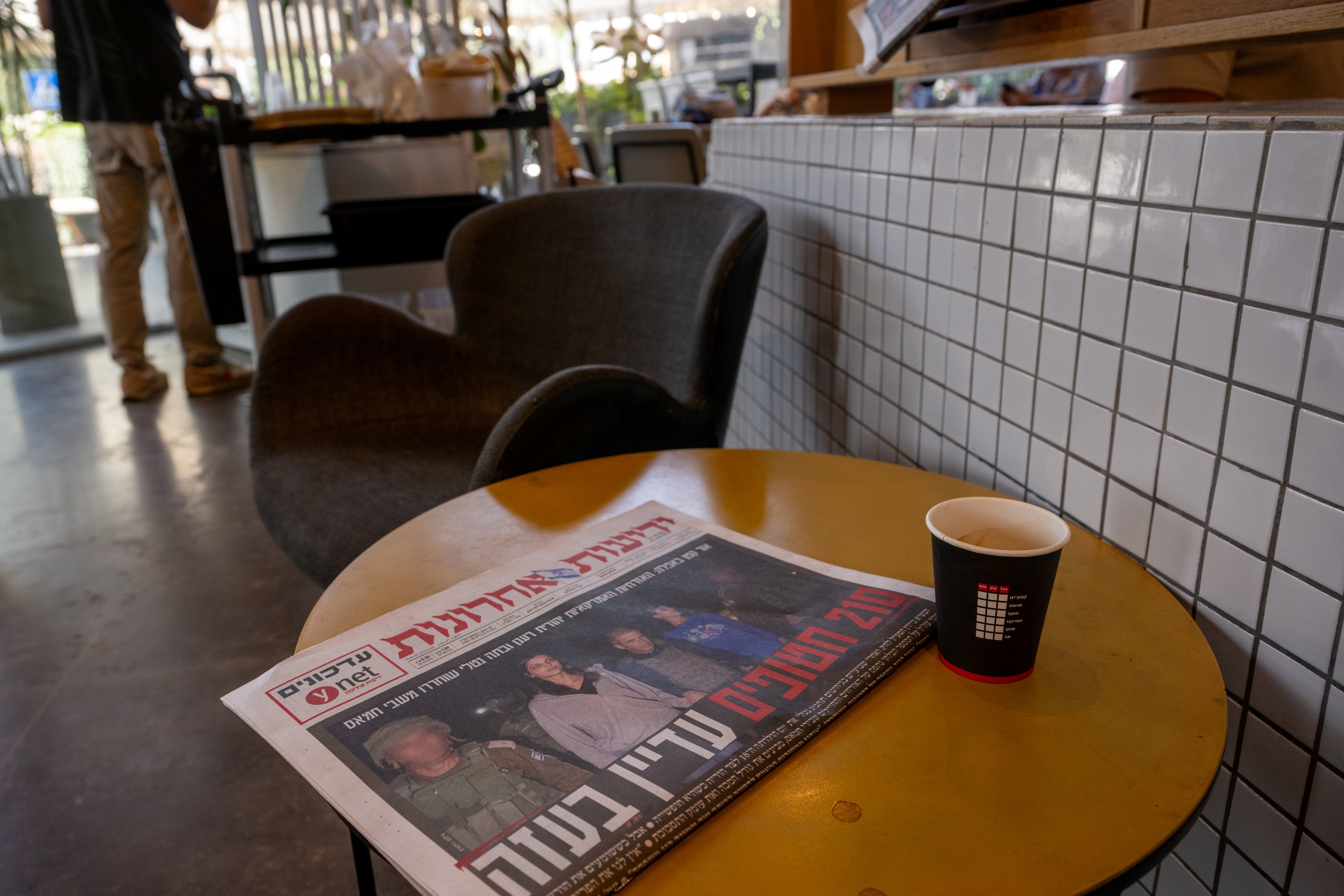منذ ما يزيد على 15 شهرا من الإبادة الجماعية، لم ينقطع الغزيون عن متابعة أخبار الصفقة التي يجري تنفيذها بين إسرائيل وفصائل المقاومة الفلسطينية في قطاع غزة ومحاولاتها السابقة، والتي رأوا فيها طوق النجاة لحرب راح ضحيتها أكثر من 46 ألف شهيد، وما يزيد على 110 الآف جريح وأكثر من 11 ألف مفقود.
وتزامنا مع بدء جولات التفاوض، كانت المطالبات الدولية بضرورة إنجاز الصفقة محركا أساسيا لإغاثة المنكوبين، بينما كانت الوعود أكثر بقرب إتمامها من المسؤولين الأمريكيين. إلا أن الوقائع على الأرض كانت تشي بغير ذلك، فظلّ المواطن الفلسطيني أسير تلك التصريحات التي تُنقَل عن مصادر مُطلعة وأخرى خاصة، وعن مسؤولين كبار بوصفهم مصادر مجهولة، ما يزيد من غموض المعلومات ويشكك في مصداقيتها.
ظلّ المواطن الفلسطيني أسير التصريحات التي تُنقَل عن مصادر مُطلعة وأخرى خاصة، وعن مسؤولين كبار بوصفهم مصادر مجهولة، ما يزيد من غموض المعلومات ويشكك في مصداقيتها.
وباستعراض عينة مما نشر في هذا السياق، من خلال التدقيق فيما نقلته بعض وسائل الإعلام الفلسطينية والعربية من أخبار عاجلة وتقارير إخبارية وتحليلات منذ بداية الجهود الرامية إلى وقف إطلاق النار، يتضح مدى التضارب في المضامين الإعلامية التي تنقل عن المصادر الإسرائيلية، ما بين مُبشرٍ بقرب إتمام الصفقة ومصدوم بوصول مسارها إلى طريق مسدود.
هكذا، نُشر بتاريخ 24 فبراير/ شباط الماضي، خبرٌ على أحد المواقع الإخبارية بالعنوان التالي: "بعد محادثات باريس.. إعلام إسرائيلي يكشف عن تهدئة محتملة في غزة قبل رمضان"، في تفاصيل الخبر المنقول عن وسائل إعلام إسرائيلية، فإن هناك احتمالات كبيرة بأن يُتوصَّل إلى صفقة تبادل محتجزين في غزة وأسرى فلسطينيين قبل بداية شهر رمضان. كذلك نشر بتاريخ 24 نوفمبر/ تشرين الثاني من العام الماضي خبر على أحد المواقع الإلكترونية مفاده: مسؤول إسرائيلي: صفقة غزة قريبة.. وحماس "مستعدة للتنازل".
وفي حيثيات الخبر الذي نُقل عن مسؤول أمني إسرائيلي بارز، استنادا إلى صحيفة "جيروزاليم بوست" الإسرائيلية، أن صفقة الرهائن في غزة باتت "أقرب من أي وقت مضى"، وأن حماس مستعدة للتنازل عن مطلبها بوقف الحرب تماما، وهو ما لم يُنقل عن أي من المصادر الفلسطينية المسؤولة عن المفاوضات منذ بدء جولاتها.
وفي ديسمبر/ كانون الأول من العام الماضي، نشرت إحدى الوكالات الإخبارية خبرا عنوانه: صحيفة إسرائيلية: صفقة تبادل أسرى بغزة قد تتم في غضون أسبوعين وفي حيثيات الخبر الذي استند على صحيفة "إسرائيل اليوم"، يُنقَل عن مسؤولين إسرائيليين، لم تسمهم الصحيفة، أن صفقة تبادل أسرى في غزة قد تتم في غضون أسبوع إلى أسبوعين.
وفي فبراير/ شباط الماضي، نشرت إحدى المنصات الرقمية الإخبارية نقلا عن القناة 12 الإسرائيلية، عن قرب التوصل إلى اتفاق بين إسرائيل وحماس. وفي حيثيات الخبر المنقول عن القناة، نجد أن مصدرا أمريكيا قال إن ثمة لمسات أخيرة توضع على اتفاق بين إسرائيل وحماس.
هذه العينة من الأخبار والتقارير التي تابعها الفلسطينيون والغزيون على وجه التحديد بكل ترقب سرعان ما تحولت إلى خيبات أمل بشأن إنهاء أوضاعهم المأساوية، وباتت وسائل الإعلام بالنسبة إليهم أقرب من الوهم. ورغم ازدياد وعي وسائل الإعلام الفلسطينية بأهمية انتقاء الأخبار من المصادر الإسرائيلية نقلا وترجمة من الإعلام العبري، فإن ثمة بعض السقطات التي قد يقع فيها بعض الصحفيين في تبني كل ما يصدر عنه بوصفه سبقا صحفيا أو رغبة في زيادة متابعة الجمهور.
تأصيل الحالة الإعلامية
حالة الترقب من الصحفيين الفلسطينيين لأخبار الصفقة في الإعلام العبري هو أمر طبيعي، كما يقول الصحفي والمختص بالشأن الإسرائيلي أحمد فياض لمجلة الصحافة؛ "لأن الجميع يبحث عن المعلومة وعن ماهيتها، خصوصا بين أوساط المسؤولين الإسرائيليين الذين تبنوا موقفًا يشوبُه كثير من الضبابية وعدم الوضوح".
ويعتقد فياض أنه "رغم ذلك فهناك حالة ضبط في الموقف الإسرائيلي بعدم الإفصاح عن كثير من مجريات الحرب وتفاصيلها، بل تفاصيلها كلها، ومن ذلك قضية استعادة الرهائن، والصفقة هي من أحد أهداف الحرب، ومن ثَمّ فقد جرى التعتيم على هذه التفاصيل التي فتحت الباب مواربًا أمام التكهنات".
وبناء عليه، لم تبدِ الحكومة الإسرائيلية هذه المعلومات أسوة بالمصادر العربية، انطلاقا من أنها تتعلق بالرقابة العسكرية، إضافة إلى بند "منع النشر"، وهي من سمات استفادة الاحتلال من الحملات والحروب السابقة، لكن هذه المرة طُبقت بحذافيرها، وما كان يخرج من الإعلام كان يخرج بالرغبة الإسرائيلية بأهداف محددة سلفا".
ورغم شح المعلومات، يمكن الملاحظة من خلال المتابعة الإعلامية أن هناك "سيلا جارفا" من المعلومات المتضاربة والإشاعات والتسريبات التي وقعت بعض وسائل الإعلام الفلسطينية ضحية لترويجها.
لكن مبعث الخطر الذي أورده الكاتب إياد القرا في تصريح لمجلة الصحافة يكمن في إرهاق المواطن الفلسطيني بالأخبار المضللة التي أبقته في حالة من التوتر طيلة الفترة الماضية من عمر الحرب؛ إذ كانت تعم أخبار التهدئة صباحا ثم سرعان ما تتلاشى في المساء.
أما فياض فيلفت النظر إلى معضلة أخرى تتجلى في أن معظم الأخبار والتسريبات التي تتعلق بالصفقة، التي تناولتها وسائل الإعلام والصحفيون الإسرائيليون، "كانت مُستقاة من مصادر عربية، ومن ثم يبحثون عن ماهية هذه الأنباء ومصداقيتها لدى المصادر الرسمية، وبعدها تعود هذه الأنباء على أنها تحليلات وليست معلومات".
معظم الأخبار والتسريبات التي تتعلق بالصفقة، التي تناولتها وسائل الإعلام الإسرائيلية، كانت مُستقاة من مصادر عربية، ومن ثم يبحث الصحفيون الإسرائيليون عن ماهية هذه الأنباء ومصداقيتها لدى المصادر الرسمية، ثم تعود هذه الأنباء على أنها تحليلات وليست معلومات".
معلومات مشوهة
كذلك لم تسلم بعض المعلومات والتصريحات الخاصة بالصفقة من التشويه، نتيجة إضافة بعض التحليلات والتفسيرات من المترجمين الناقلين، فضلا عن اختيار قراءات معينة لبعض المواقف وترجمتها.
ومما لوحظ، بحسب فياض، أن بعض وسائل الإعلام العربية كانت تركز على ترجمة ما يتداوله الكتاب الإسرائيليون والباحثون بمراكز الأبحاث أو ضباط الاحتياط المتقاعدون في البرامج الحوارية المتلفزة، ومن ثم تؤخذ على أنها معلومات تُقدم للجمهور العربي والفلسطيني، وهذه المداولات نابعة بالأساس من الإعلام العربي.
يتفق إياد القرا مع هذه الرؤية قائلا إن "المشكلة حديثة قديمة، ورغم التحسن في أداء وسائل الإعلام بهذا الخصوص، لا تزال ترتكب مخالفات مهنية في هذا الموضوع".
وانعكاسا لما سبق، ظهر في بعض الحالات "تلهف" بعض المترجمين للانسياق خلف ترجمة المضامين الإعلامية المتعلقة بالصفقة، من دون تمييز بين الخبر والدعاية، حتى وصل الحال أحيانا إلى ترجمة معلومة في مقال، أو رأي لباحث، أو مراسل عسكري أو خبير إستراتيجي في وسيلة إعلامية ما، تجتزأ من السياق وتؤخذ بوصفها سبقا صحفيا.
تتمثل خطورة هذه الترجمة غير المحكومة بضوابط مهنية، استنادا إلى القرا، في أنها أدت في كثير من الأحيان إلى إحداث حالة من الارتباك لدى النازحين وعودتهم إلى منازلهم التي تبين لاحقا أنها كانت كمائن الموت.
ظهر في بعض الحالات "تلهف" بعض المترجمين/ الناقلين للانسياق خلف ترجمة المضامين الإعلامية المتعلقة بالصفقة، من دون تمييز بين الخبر والدعاية، حتى وصل الحال أحيانا إلى ترجمة معلومة في مقال، أو رأي لباحث، أو مراسل عسكري أو خبير إستراتيجي في وسيلة إعلامية ما، تجتزأ من السياق وتؤخذ بوصفها سبقا صحفيا
حلول مرتقبة
أمام هذا السيل الجارف من الأخبار المضللة التي أسهمت في نشرها وسائل التواصل الاجتماعي، فإن المطلوب من الإعلاميين ضبط حالة الترجمة والنقل بما يخدم مصالح المجتمع الفلسطيني، وبما يؤسس لمبدأ المسؤولية الاجتماعية لوسائل الإعلام في الحفاظ على مصالح المجتمع وفي مقدمتها الحالة الشعورية للنازحين المُترقبين لأنباء وقف إطلاق النار. ولن يتأتى ذلك، حسب القرا، إلا بتبني الصحفي الفلسطيني موقفا وطنيا واضحا فيما ينشر عن الصفقة ومجرياتها حتى بعد إتمامها.
لذلك فإن واقع الحال يؤكد ضرورة الاستفادة من التجربة الإعلامية للحرب، كما يقول الإعلامي فياض: "أسوة باللجان التي تُشكّل لبحث أداء الإعلام الإسرائيلي وسلوكه وتقصي العبر والدروس من الإخفاقات بغية تصحيح المسار مستقبلا".
كذلك فإن ناقلي هذه الأخبار مُطالبون بضرورة تفنيد ما يترجمونه للجمهور أو وضعه في سياقه الأساسي، وإبرازه بشكله الحقيقي، وبيان طبيعة النص المُترجم بين ما يُصنّف على أنه معلومة أو ما يُصنف على أنه رأي.
ينبغي أيضا على جامعاتنا الفلسطينية الاهتمام بتخريج إعلاميين على دراية بلغات أجنبية إضافة إلى إتقان اللغة العبرية؛ لأن الرواية الفلسطينية واضحة وعادلة ولا تحتاج إلى كثير من الجهد في تسويقها إذا ما أحكم الخطاب الإعلامي الخاص بها.
تأسيسا على ما سبق، وعلى الرغم من صعوبة ضبط الحالة الإعلامية كليا، فإن المحددات الرئيسة الناظمة للإعلام المهني والمسؤول والرقابة الذاتية تظل الفيصل الرئيس لدى الإعلاميين في غربلة كل ما يصدر عن الإعلام الإسرائيلي ووضعه تحت مجهر التمحيص والتدقيق والترجمة المنضبطة حفاظا على المهنة ومعنويات الناس وحيواتهم أيضا.












































